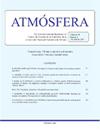基于ann和ANFIS模型的滴灌核桃作物水分利用估算
IF 1
4区 地球科学
Q4 METEOROLOGY & ATMOSPHERIC SCIENCES
引用次数: 0
摘要
核桃树及其果实是农业的重要组成部分,其种植对全球经济做出了重大贡献。灌溉是核桃栽培的一个关键因素,其最重要的问题是如何准确估算核桃的灌溉需水量。利用半干旱气候条件下的新疆西部地区的气象数据,采用人工神经网络(ann)和自适应神经模糊推理系统(ANFIS)相结合的人工智能方法对核桃水分的利用进行了估算。基于2016-2019年最高、最低和平均温度、风速和日照时数的概率情景,利用人工神经网络和ANFIS模型进行了测试,以估计核桃的蒸散量。结果表明,在R = 0.95、日照时数和平均温度两个气候参数下,人工神经网络和ANFIS模型在训练和测试中表现最佳。ann和ANFIS模型均能较好地预测作物水分利用,且具有较高的相关性和最少的气候参数。然而,与ann模型相比,ANFIS模型具有更高的预测能力,其MSE较小(训练为0.36,测试为0.29)。本文章由计算机程序翻译,如有差异,请以英文原文为准。
Crop water use estimation of drip irrigated walnut using ANNs and ANFIS models
Walnut trees, as well as their fruits, represent an important sector of the agricultural industry and their cultivation significantly contributes to the global economy. Irrigation is a key factor in walnut cultivation and the most important problem is related to accurately estimating the need for irrigation water. Walnut water use was estimated in this study through the artificial intelligence methods of Artificial Neural Networks (ANNs) and Adaptive Neuro-Fuzzy Inference System (ANFIS) using meteorological data in western Türkiye, which has semi-arid climatic conditions. Probabilistic scenarios based on maximum, minimum and average temperature, wind speed and sunshine hours over the period 2016-2019 were developed and tested with ANNs and ANFIS models to estimate walnut evapotranspiration. Results indicate that the optimum performance in the training and testing for ANNs and ANFIS models was obtained from the fourth scenario with R = 0.95 and two climate parameters -sunshine duration and mean temperature-. Both ANNs and ANFIS models were able to predict crop water use obtaining high correlation and the minimum number of climatic parameters. Nevertheless, the ANFIS model had a higher predictive capacity, with smaller MSE (0.36 for training and 0.29 for testing) compared to the ANNs model.
求助全文
通过发布文献求助,成功后即可免费获取论文全文。
去求助
来源期刊

Atmosfera
地学-气象与大气科学
CiteScore
2.20
自引率
0.00%
发文量
46
审稿时长
6 months
期刊介绍:
ATMÓSFERA seeks contributions on theoretical, basic, empirical and applied research in all the areas of atmospheric sciences, with emphasis on meteorology, climatology, aeronomy, physics, chemistry, and aerobiology. Interdisciplinary contributions are also accepted; especially those related with oceanography, hydrology, climate variability and change, ecology, forestry, glaciology, agriculture, environmental pollution, and other topics related to economy and society as they are affected by atmospheric hazards.
 求助内容:
求助内容: 应助结果提醒方式:
应助结果提醒方式:


